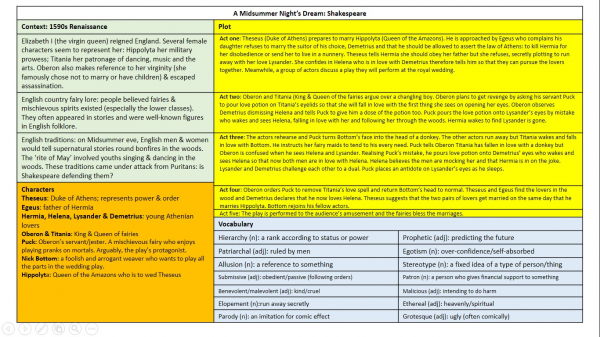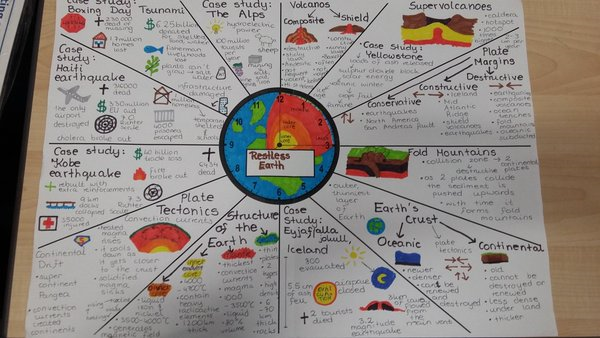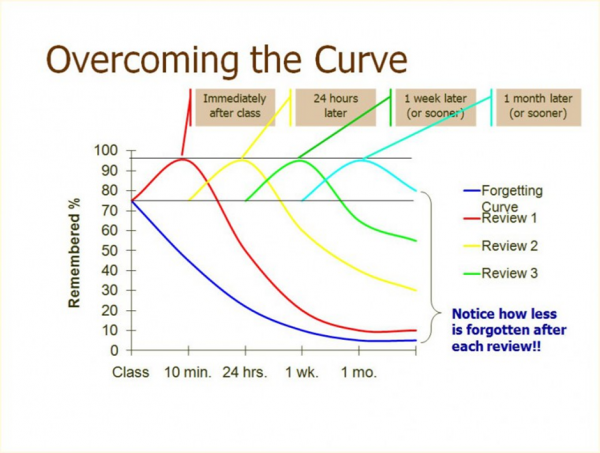Examinations are becoming increasingly challenging. At GCSE, most subjects have lost their controlled assessments (previously known as coursework) and have been replaced with additional exam papers. The focus of GCSE and A level exams is the retrieval and application of knowledge. This puts increasing pressure on students to know and retain even more information for longer
The following strategies will support students in all year groups in developing the skills required to be successful in their assessments, and ultimately in the new style GCSE and ‘A’ level examinations:-
1. Knowledge organisers
At the end of each unit of work students should develop summary materials, or knowledge organisers, of the work they have covered in class. A knowledge organiser is a set of key facts or information that students need to know and be able to recall in order to master a unit or topic. Typically an organiser fits onto one page of A4 or A3 – this helps students to visualize the layout of the page which in turn helps them to memorise the information better. It may be that students prefer to use a series of ‘flashcards’ to summarise the information.
Specimen templates are available here
2. Assessment Preparation
We can define learning as “an alteration in long-term memory”. The focus of many GCSE and A level courses are high stakes final assessments that place value upon the retrieval and application of knowledge. This means that students must be practiced in the ability to retrieve key knowledge and facts so that they are able to answer any asessment/examination questions that may occur.
In school we weave the use of key strategies for knowledge retrieval into the fabric of our lessons so that we are modelling how we want our students to prepare outside of the classroom. The following strategies will support students in all year groups in developing the skills required to be successful in their assessments, and ultimately in the current GCSE and ‘A’ level examinations:-
1. Knowledge organisers – this can stay the same as on the web page.
2. Retrieval practice (use the following paragraph instead of the one available)
Research around memory suggests that if knowledge is studied once and not revisited or revised, it is not stored in the long-term memory. This means that after one lesson, or revising for one test, the knowledge will not be retrievable unless it is studied again. The ability for a student to recall information easily is diminished unless it is revisited frequently, which will embed it in the long term memory. In the long term this makes recall far easier.
On occasion some students leave their revision until a few weeks (best case scenario) or days/hours (worst case scenario) before the examinations and assessments. This presents a problem. Our short term memory is designed to be just that and has limited capacity. Students find themselves unable to retain the information, they become stressed and often give up, convincing themselves they are no good at revising or that they “can’t do subject ‘x’ ”.
As part of home learning, students should be revising what they have been taught recently but also content they were taught previously.
The secret to success is to regularly revisit the knowledge to be learned (known as ‘spaced practice’*). This helps transfer the knowledge from the short-term memory to the long term memory ie. it helps to make ‘learning stick’.
A good guide for retrieval practice is by Kate Jones – https://www.youtube.com/watch?v=U_-TaSzYmx8
[https://www.bing.com/th?id=OVP.Bxtz-V5a3qDvx3_d7bkclQEsDh&pid=Api]<https://www.youtube.com/watch?v=U_-TaSzYmx8>
Retrieval Practice: A guide for parents, carers & families<https://www.youtube.com/watch?v=U_-TaSzYmx8>
An explanation of retrieval practice and how it can be used inside and outside of the classroom to support learning. Please feel free to share with parents, carers & families in your school community.
www.youtube.com
Suggested activities for parents
To get the most out of the Knowledge Organisers, your son should be learning sections and then testing himself.
This should be an ongoing process, not just in the lead up to assessments and examinations.
This help sheet will give you some tips on how your son can successfully use his Knowledge Organisers.
The Six Strategies for Effective Learning
‘The Learning Scientists’ have identified 6 strategies for effective learning :-
- Spaced practice
- Retrieval practice
- Elaboration
- Interleaving
- Concrete examples
- Dual coding
More information about each of these strategies is available at
http://www.learningscientists.org/downloadable-materials
To find specific subject revision materials for year 7 & 8 click HERE






